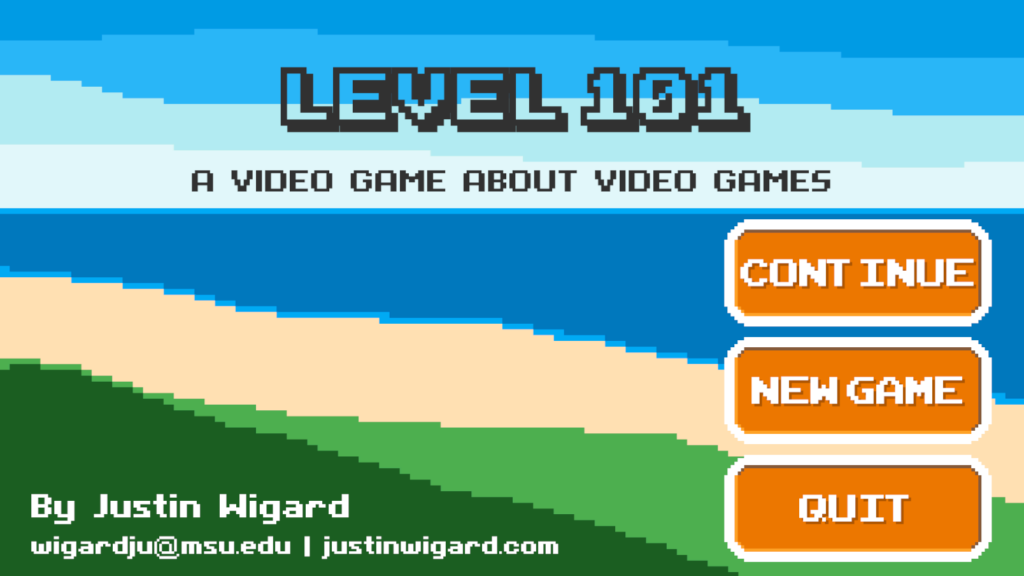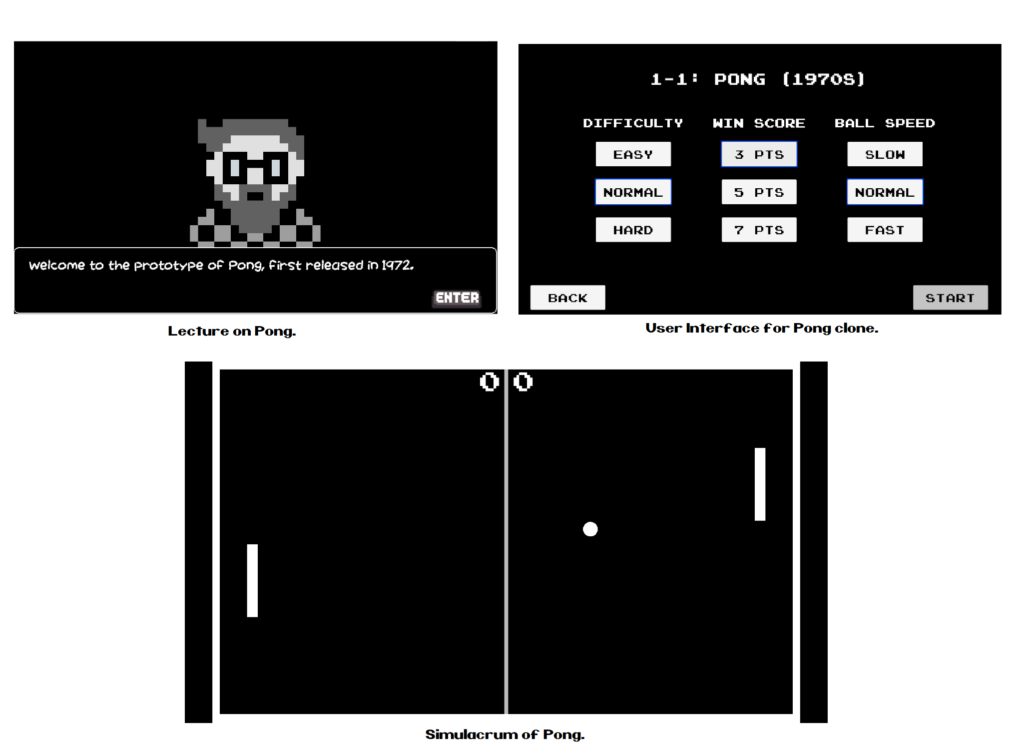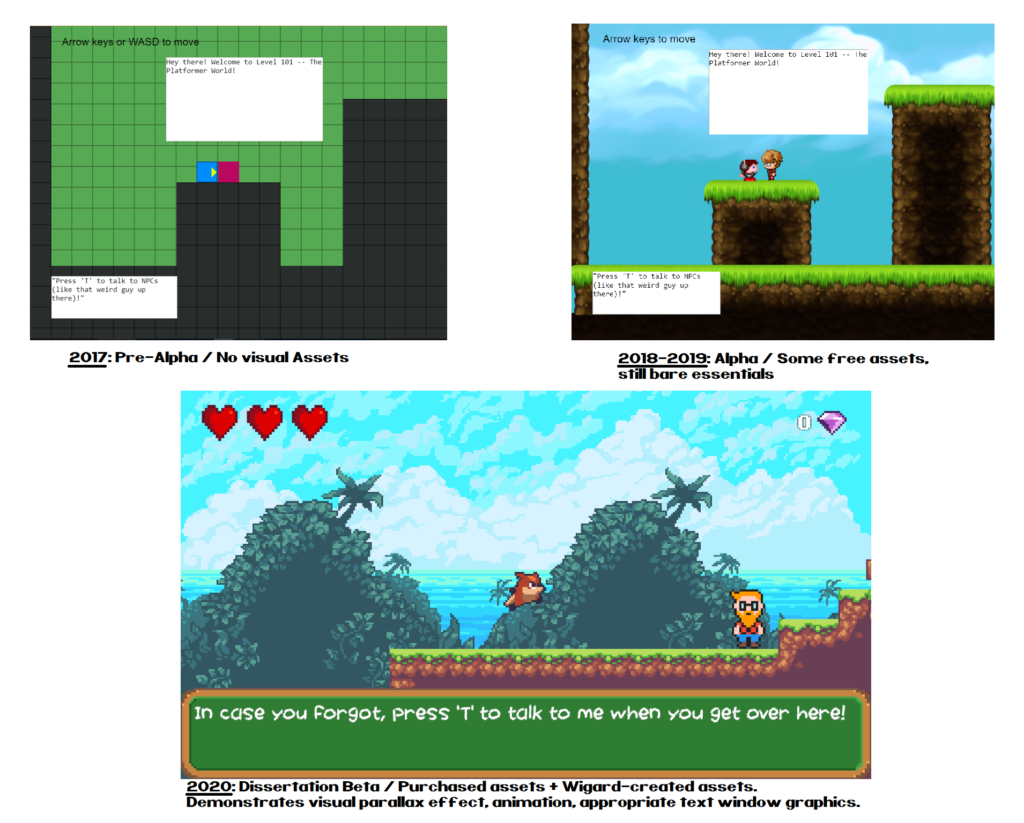Summer 2020 Seed Grant Funding
Report Submitted by Justin Wigard
Prior to receiving the 2020 DH Summer Seed Grant, I was the recipient of a 2018 DH Summer Seed Grant, and that report can be found here. Since 2018, this project has grown from a pedagogical DH project into my dissertation; as such, I applied for the 2020 DH Summer Seed Grant to further the development of Level 101, a serious game that is being developed with the program Unity to address gaps in game studies and higher education. This grant went towards three components of research and development in order to further the development of Level 101: 1) Unity development assets; 2) Playtesting hardware; 3) Preservation and distribution hardware.

As my dissertation, Level 101: A Video Game About Video Games is a serious video game that explains, interrogates, and deconstructs the video game medium through three significant branches of understanding video games: 1) History, 2) Design, and 3) Theory. Each of these three branches features five levels that are designed to educate players about the video game as a medium, as well as encourage players to think critically about video games and the process of playing through them.
Level 101 makes several crucial and critical interventions as its guiding premises. First, it advocates for alternative scholarship in the form of a digital, interactive, and playable artifact. Second, it advances play as a mode of critical inquiry and humanistic pedagogy, particularly in relation to the digital medium of video games and to game studies. Third, Level 101 acts as an artifact of critical-making, bridging the divide between game creators and game scholars. This dissertation is designed to be simplistic and accessible in gameplay but deep in lessons and dialogue, allowing for the core audiences of undergraduate students and media/DH/pedagogy scholars alike to find value in the endeavor. Level 101 also answers the call from Matt Burton et al’s article “Digits: Two Reports on New Units of Scholarly Publication” for non-traditional scholarly objects, particularly digital ones, to effect change and challenging traditional modes of scholastic inquiry.
Since this is my dissertation, I am handling as much of the development, writing, and programming on my own. As a result of the DH Summer Seed Grant, the project’s development process has been kickstarted, moving from a nascent form of pre-production a firm production stage.
The initial planned outcomes of the 2020 DH Summer Seed Grant were threefold: 1) a deliverable digital game dissertation; 2) a DH article draft; 3) the presentation of this project at pedagogical, academic, and public venues (including an exhibit using the MSU DSL space). However, as a result of the 2020 COVID-19 Pandemic, my project trajectory evolved and adapted to suit. What follows is an accounting of the original outcomes and the adapted trajectory.
The initial planned outcome was to have a major playable demo of each chapter by the end of summer. Instead, I have made significant progress in the form of a playable demo of two chapters: History and Design.
Within each chapter, I have been able to create a playable lecture section, a playable game iteration, and a results screen. This model mimics one standard pedagogy loop of classroom instruction of direct instruction, learner application, and pedagogical feedback.
As an example, the History chapter begins in the 1970s with a short lecture on early video game prototypes before focusing in on Atari’s Pong (1972), a game that has had an undeniable cultural and historical legacy on the development of video games. Next, players are able to play a simulacrum of Pong to understand its affordances in a playable format, rather than seeing the game in static images within a book. To complete the level, they must beat the computer AI in a round of the simulacrum, demonstrating their knowledge of game history (though, players do have a choice of Easy/Medium/Hard to account for player skill level). Once completed, players move on to the 1980s, and so on.

Developing Level 101 consists of script-writing, programming, object connections, playtesting, and revising. The DH Summer Seed Grant allowed me to purchase playtesting hardware in the form of a USB controller; this has allowed me to playtest the game for different game consoles, whereas I was previously only able to playtest the game for web interfaces. This expansion is valuable as it allows for reaching a potential of reaching larger audiences, particularly ones outside of the academic sphere.
One major outcome of this project is to push the boundaries of digital research and alternative scholarship; thus, my aim was to develop this project for publication, particularly in a digital environment.
I am very fortunate and humbled to say that this project has been submitted to and accepted for publication within a forthcoming edited collection on game historiographies. Due to the hybrid nature of this edited collection, I am currently working with the editors to present a playable portion of the game as the article itself, taking advantage of the digital medium to actually include not just a post-mortem textual report, but a playable section of the game itself as the scholarship. I plan to update this report with a dedicated link to the publication when it becomes available.
Initially, I planned to submit this project to the Serious Games conference Meaningful Play, held biannually at Michigan State University. This conference is a seminal event in the field of game studies due in no small part to the critical work done by scholar-creators sharing game demonstrations at the event. Due to COVID, this conference has been moved to 2021, and I plan to submit the project at that time.
To fill the void of Meaningful Play 2020, I participated in the 2020 Digital Pedagogy Lab in July, held virtually for the first time. This event brings together educators from various fields and approaches together around different workshop tracks; I participated in “PreK-20 Recess: Play in the Time of Pandemic,” a workshop centering conversations around the notion of play (central to my dissertation) and what that might look like in the current moment. Alongside these conversations, we also workshopped our project, allowing me to not only share this project with further communities outside MSU, including K-12 educators and scholars in different fields, but shape it based on their feedback.
One primary limitation to this project is that my expertise lies outside the realms of asset creation. However, through the allocation of grant funding, I was able to rely on Unity’s preexisting game development ecosystem. Within Unity, games are created with a combination of C# coding, hooking up the C# scripts to in-game objects, and then utilizing Unity itself to generate interactions between those objects and the environment. Those in-game objects are Assets, which are audio and visual items, including character sprites or expansive environment visuals, background music or simply just a “Plink” sound effect for a ping-pong ball hitting a boundary. Assets can be built from the ground up, but this requires specialization in this skill and encourages collaboration, a process not viable within the individual confines of a dissertation project. However, Unity’s ecosystem encourages uploading of game development assets for use within Unity; if a user wants to use somebody else’s premade low-polygon dinosaurs in their game, a one-time license purchase is required, and that asset can be used in any Unity project.
Thus, I have used a portion of the grant to purchase much-needed audio and visual assets to develop these chapters in the form of game frames, character sprites, and sound effects/songs. Shown here are images of what a level from chapter 2 looked like in pre-alpha with no assets, from 2018 and 2019 with some visual assets, and most recently in its final stage.

One outcome of the grant has been the purchase and acquisition of a Raspberry Pi 4 computer and related external storage. Over the last few months, I have been working to develop and house my dissertation on this portable computer with the intention of archiving a hard copy of the project for preservation. Due to the issues of digital decay and fragile webspaces, particularly with a game project that is intended to evolve and grow over time, I want to preserve Level 101 on a powerful miniature computer dedicated solely to this digital dissertation.

As a result of my participation in the 2020 Summer Data Visualization Institute, I have also been working with Terence O’Neill on a public exhibition of Level 101 utilizing the affordances of the 360 Room within MSU’s Digital Scholarship Lab. Again, this effort has been delayed somewhat due to social distancing and COVID-19, but I plan to host this exhibit in Spring 2021. One unexpected outcome therein is that Terence and I have been working to think through the possibilities of what a digital exhibit built around a playable game might look like using this visualization technology.
Lastly, I am excited about the prospect of finishing this digital dissertation. My ongoing conversations with DH@MSU communities and external parties have contributed greatly to the development of this project over its lifetime, as have the 2018 and 2020 DH Summer Seed Grants. The goals are to continue deploying this project to my future classes, present this work at Meaningful Play 2021, and defend this digital dissertation in Spring 2021.